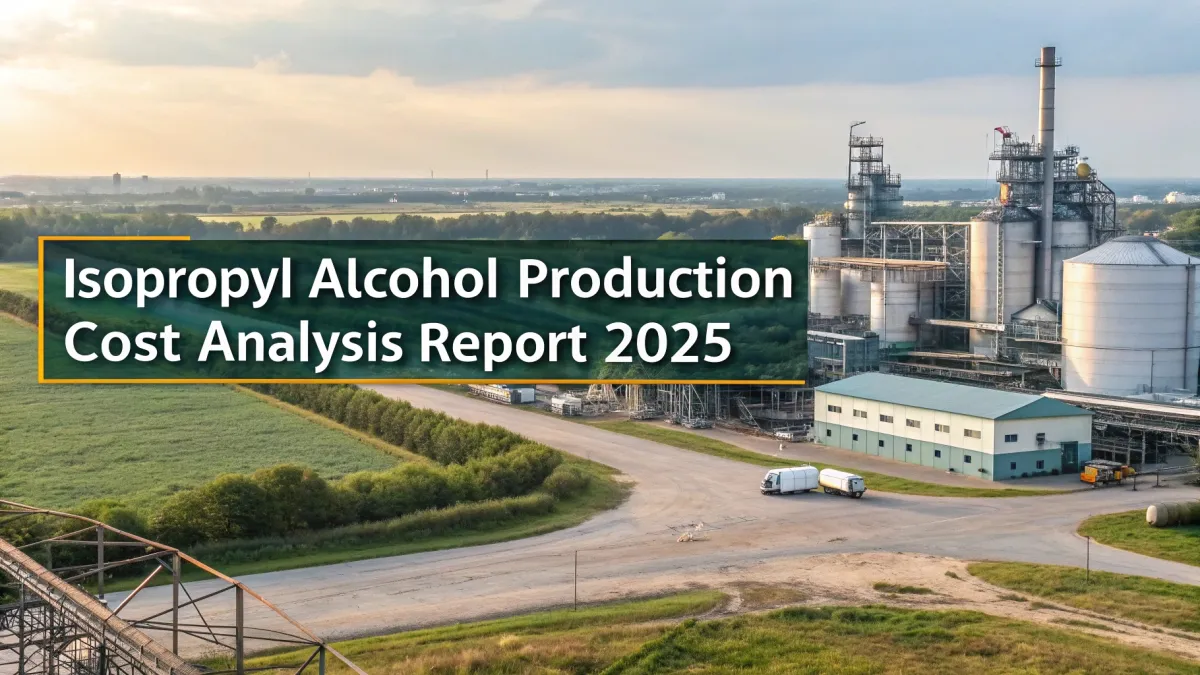
Isopropyl Alcohol Production Cost Analysis Report 2025: Feasibility Study, Plant Setup, And Profitability Insights
Setting up an isopropyl alcohol production plant involves securing raw materials such as propylene and water, establishing catalytic hydration or indirect hydration processes, and ensuring efficient distillation systems. The facility must comply with environmental, health, and safety regulations, while incorporating quality control systems to meet pharmaceutical and industrial-grade standards.
IMARC Group's “Isopropyl Alcohol Production Cost Analysis Report 2025: Industry Trends, Plant Setup, Machinery, Raw Materials, Investment Opportunities, Cost and Revenue” offers a detailed and practical guide for entrepreneurs and businesses looking to enter the production industry. The report includes in-depth analysis of capital investment requirements, project financing options, working capital needs, and projected returns.
This comprehensive business plan outlines every critical step involved in setting up a successful production plant unit from understanding the industry landscape to planning for real-world challenges. It provides valuable insights into essential components such as isopropyl alcohol production plant cost, machinery cost, operating cost, raw material requirements, utility needs, infrastructure setup, and packaging logistics.
Request for a Sample Report : https://www.imarcgroup.com/isopropyl-alcohol-manufacturing-plant-project-report/requestsample
Isopropyl Alcohol Industry outlook 2025:
The isopropyl alcohol industry outlook for 2025 indicates steady growth driven by sustained demand from pharmaceuticals, personal care, and electronics manufacturing. Increased use in disinfectants and sanitizers continues to support market expansion, while rising applications in industrial solvents and chemical intermediates further strengthen demand. Advancements in production technologies and capacity expansions across Asia-Pacific are expected to enhance supply capabilities. However, price fluctuations of raw materials and strict regulatory standards may pose challenges. Overall, the industry is projected to remain resilient, with healthcare and hygiene trends playing a pivotal role in shaping market dynamics.
Key Insights for Isopropyl Alcohol Production Plant Setup:
Detailed Process Flow:
-
Product Overview
Unit Operations Involved
Mass Balance and Raw Material Requirements
Quality Assurance Criteria
Technical Tests
Project Details, Requirements and Costs Involved:
-
Land, Location and Site Development
Plant Layout
Machinery Requirements and Costs
Raw Material Requirements and Costs
Packaging Requirements and Costs
Transportation Requirements and Costs
Utility Requirements and Costs
Human Resource Requirements and Costs
Capital Expenditure (CapEx) and Operational Expenditure (OpEx) Analysis:
Project Economics:
-
Capital Investments
Operating Costs
Expenditure Projections
Revenue Projections
Taxation and Depreciation
Profit Projections
Financial Analysis
Profitability Analysis:
-
Total Income
Total Expenditure
Gross Profit
Gross Margin
Net Profit
Net Margin
Key Cost Components of Setting Up an Isopropyl Alcohol Plant :
-
Raw Materials – Procurement of propylene and water as primary feedstocks.
Plant Infrastructure – Land acquisition, construction, and site development costs.
Machinery and Equipment – Catalytic reactors, hydration units, distillation columns, storage tanks, and utilities.
Utilities and Energy – Electricity, steam, cooling water, and fuel requirements.
Labor and Staffing – Skilled and unskilled workforce, training, and ongoing wages.
Quality Control and Testing – Laboratory setup for purity and safety compliance.
Regulatory Compliance – Environmental permits, safety standards, and certification costs.
Logistics and Distribution – Packaging, storage, and transportation infrastructure.
Maintenance and Overheads – Routine servicing, spare parts, and operational expenses.
Economic Trends Influencing Isopropyl Alcohol Plant Setup Costs 2025 :
-
Fluctuating Raw Material Prices – Propylene prices remain volatile due to crude oil market dynamics, directly impacting production costs.
Energy Costs – Rising global energy prices increase operational expenses for power, steam, and cooling requirements.
Inflationary Pressures – Higher costs of construction materials, equipment, and labor influence overall capital expenditure.
Regulatory Compliance Costs – Stricter environmental and safety standards add to permitting and technology upgrade expenses.
Technological Advancements – Adoption of energy-efficient processes may raise upfront investment but reduce long-term costs.
Regional Industrial Policies – Incentives or subsidies in Asia-Pacific and Middle East markets may offset setup costs.
Request for Customized Report: https://www.imarcgroup.com/request?type=report&id=7704&flag=E
Challenges and Considerations for Investors in Isopropyl Alcohol Plant Projects:
-
Raw Material Dependency – Reliance on propylene, a petrochemical derivative, exposes projects to feedstock price volatility.
High Capital Investment – Significant expenditure on infrastructure, equipment, and regulatory compliance increases financial risk.
Regulatory Hurdles – Meeting stringent environmental, health, and safety standards can delay project timelines and add costs.
Market Competition – Presence of established global producers creates pricing pressures and challenges in gaining market share.
Demand Fluctuations – Consumption patterns linked to healthcare, industrial cleaning, and electronics may vary with economic cycles.
Supply Chain Constraints – Logistics, transportation costs, and storage requirements can impact operational efficiency.
Technology Selection – Choosing between direct and indirect hydration processes affects cost structure, efficiency, and scalability.
Conclusion:
The establishment of an isopropyl alcohol production plant presents a promising investment opportunity, supported by sustained demand across pharmaceuticals, healthcare, personal care, and industrial applications. However, careful consideration of raw material price volatility, high capital expenditure, and regulatory compliance is essential for long-term viability. Strategic selection of technology, efficient supply chain management, and alignment with regional industrial policies can significantly enhance competitiveness. Despite challenges, the industry outlook for 2025 remains favorable, with growing global emphasis on hygiene, healthcare, and industrial solvents driving market resilience and continued expansion potential.
About Us:
IMARC Group is a global management consulting firm that helps the world's most ambitious changemakers to create a lasting impact. The company excel in understanding its client's business priorities and delivering tailored solutions that drive meaningful outcomes. We provide a comprehensive suite of market entry and expansion services. Our offerings include thorough market assessment, feasibility studies, company incorporation assistance, factory setup support, regulatory approvals and licensing navigation, branding, marketing and sales strategies, competitive landscape, and benchmarking analyses, pricing and cost research, and procurement research.
Contact Us:
IMARC Group
134 N 4th St. Brooklyn, NY 11249, USA
Email: sales[@]imarcgroup.com
Tel No:(D) +91 120 433 0800
United States: (+1-201971-6302)
Legal Disclaimer:
MENAFN provides the
information “as is” without warranty of any kind. We do not accept
any responsibility or liability for the accuracy, content, images,
videos, licenses, completeness, legality, or reliability of the information
contained in this article. If you have any complaints or copyright
issues related to this article, kindly contact the provider above.


















Comments
No comment